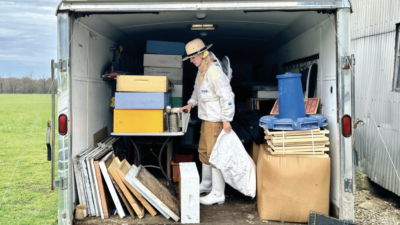It was Dolly Neely, a former reality TV star-turned-Pennsylvania beekeeper who introduced me to her growing colony of bees.

I met Neely at her farm in Mercer County near Jackson Center, between Pittsburgh and Erie.
On my drive to Bird’s Eye View Farm, I whirred past the sprawling properties of working farms and over rough-hewn bridges fashioned to cross creeks and ponds. Neely’s land is flanked by dandelion fields. Bee food.
In 2004, Neely began to explore backyard beekeeping upon her return to Mercer County after appearing on the television show “Survivor.” She has since acquired chickens and other birds, domesticated opossums, and about 50 honeybee colonies.
“It’s become the birds and the bees,” she said. “The bees have won my heart because they’re so necessary to life. If we don’t have pollinators, we won’t have food. It sounds extreme to say that, but that’s just the way it is.”
Her bees live atop pallets, designed to be transferred to farms and orchards for pollination to help grow an array of crops, such as blueberries and watermelons, Neely said.
As she explained the workings of her hives, Neely hesitated to discuss whether climate change may have affected her hives during her seven beekeeping seasons.
“But there’s a saying that goes, ‘If you talk to 30 beekeepers, you’re going to get 40 different opinions.’ You can talk to me all day long and then go to the beekeeper up the road and he might say something totally different,” she said.
Though Pennsylvania temperatures have increased almost 2 degrees over the past century, according to the Department of Environmental Protection, and are estimated to rise another near-6 degrees by 2050, Neely said her hives have grown over the years, and she has seen more feral bees spread across her 88 acres.
Although she has made adjustments to her hives’ environments and diets, mitigating lethal parasites such as varroa mites and surviving the cold are some of the hurdles that Neely’s bees face.
To keep them alive over Pennsylvania winters, she started hauling them to Georgia to fulfill pollination contracts down South.
And while Neely’s hives produce sunflower honey — plenty of it — she’s in the business of making bees.
Bees contribute more than $20 billion in pollination service to the U.S., and honey production generates around $300 million annually for beekeepers, according to the U.S. Department of Agriculture (USDA). Some special queens — genetically altered to help them fight certain parasites — can cost up to $600 a pop.
With bare hands, Neely poked around an open tray of bees at the observation hive where they buzzed and toiled, inches from my own fingers. She identified the queen, pinching her carefully between thumb and pointer, and marked a small, red dot on her back with an acrylic paint pen to keep track of her.
The chance that one of her hives would swarm is low, she said. They’re at peace as long as they are pleased with their queen.
Neely explained the bee kitchen where honey is processed and queens are bred and incubated. Instead of utensils in the drawers, I found hundreds of tiny, bear-shaped honey containers. The stainless steel refrigerator was set to a toasty 94 degrees to grow queens.
She runs most everything on the farm alone, and it’s hard not to draw a connection between her nose-to-the-grindstone approach to work and the industrious queen and worker bees, who banish male bees from the hive after mating.
“People ask, ‘Why don’t you hire somebody?’
“I can keep up,” she said.







